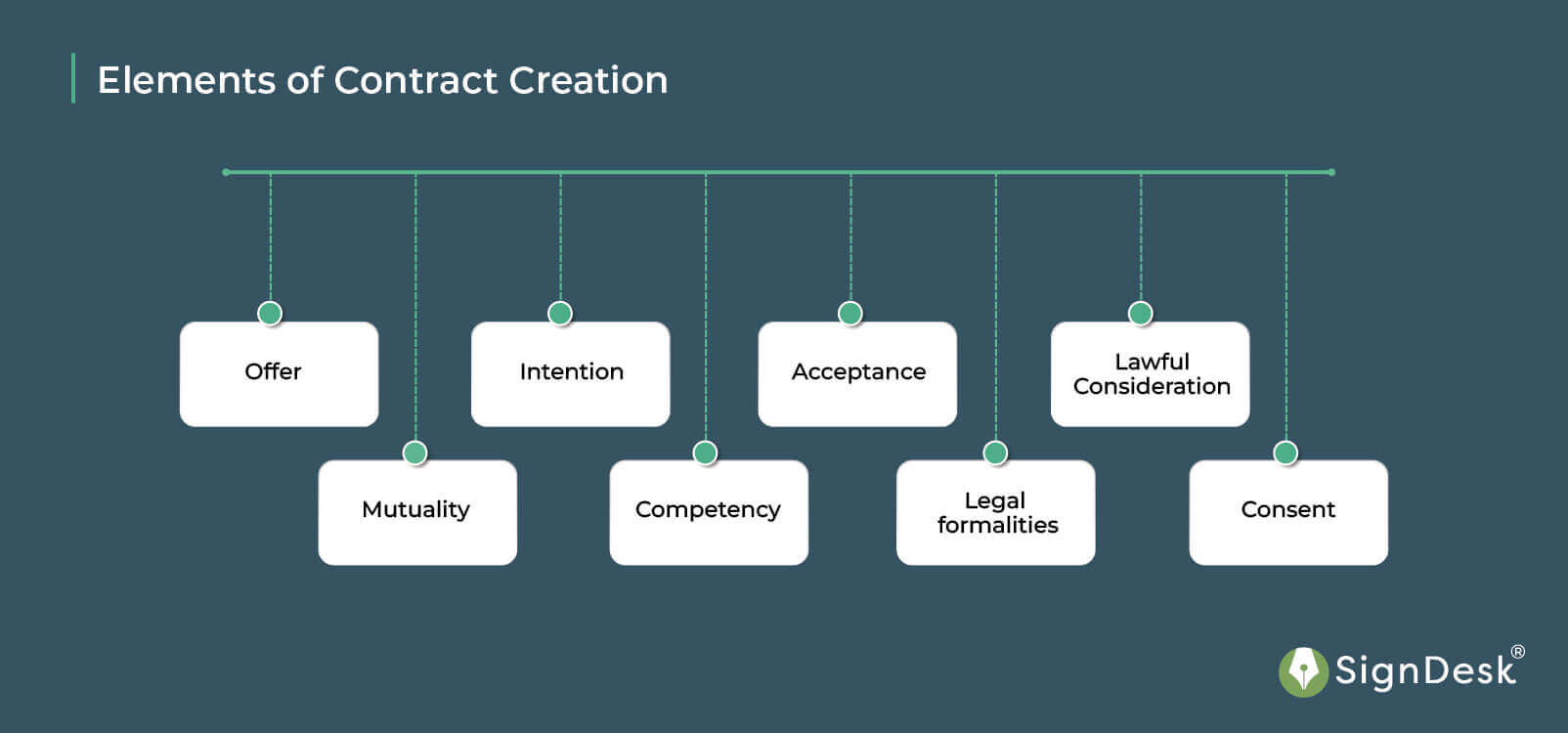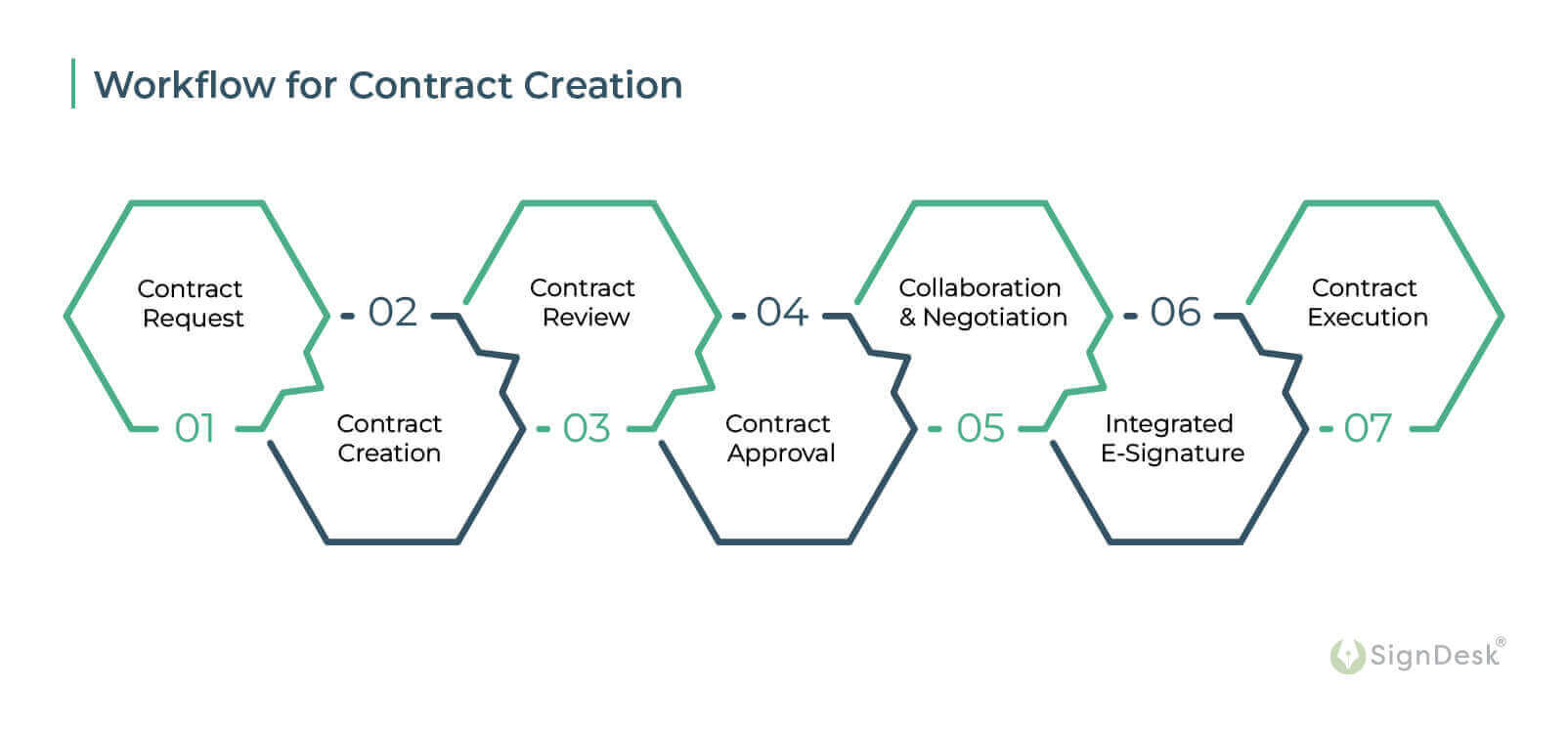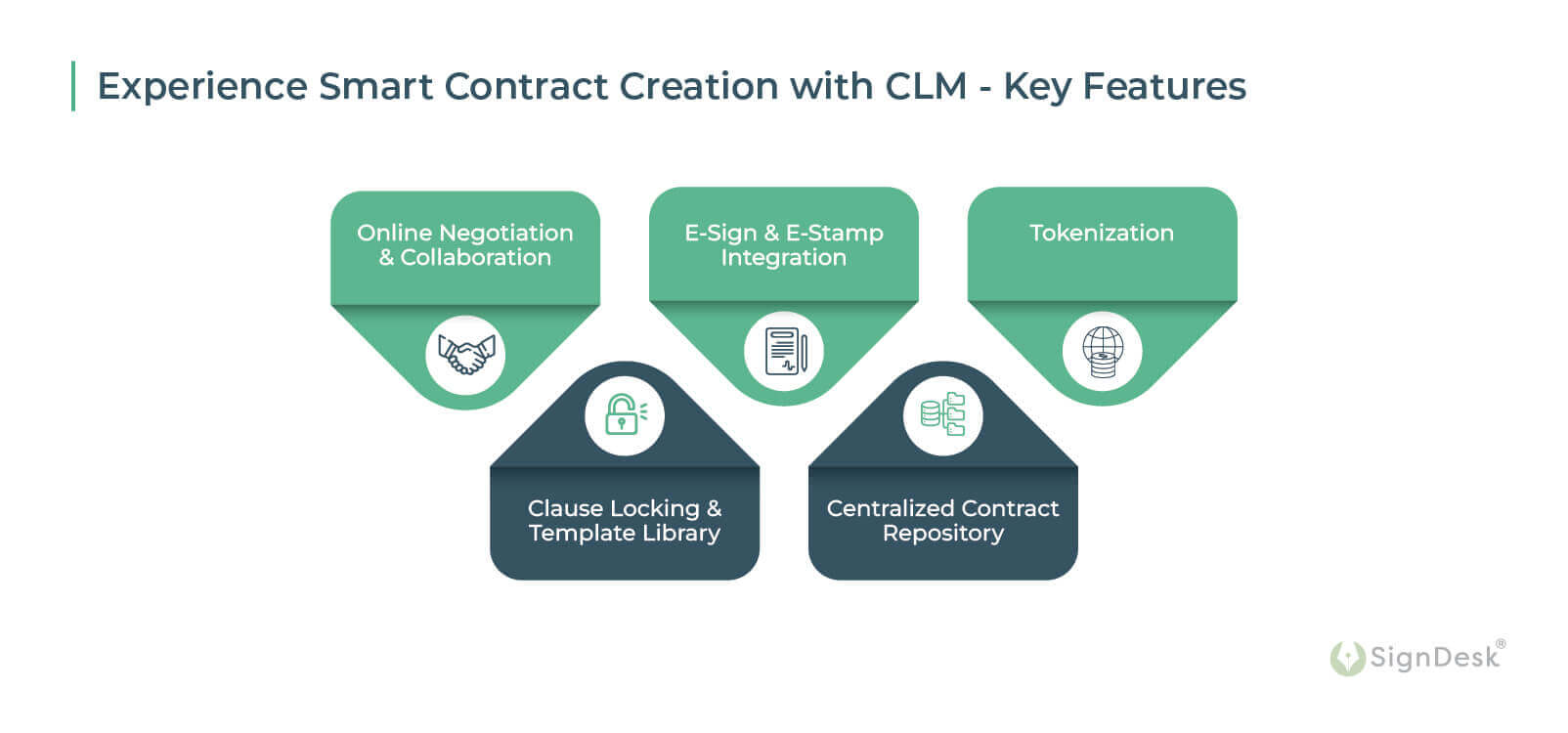A Brief Introduction To Contract Creation On CLM
Contract creation is of utmost importance for business organizations as it establishes legal protection, defines rights and responsibilities, manages risks, ensures clarity in business relationships, and provides a framework for successful collaboration. Contracts serve as the foundation for business agreements, outlining key terms, obligations & expectations, and help mitigate potential conflicts or misunderstandings.
Contract lifecycle management software offers features such as templates, clause libraries, and collaborative editing to simplify contract creation. It allows organizations to efficiently draft, review, and manage contracts in a centralized digital environment.
Business organizations and legal firms can use CLM software to draft comprehensive regulatory contracts and customize agreements as required. CLM software enables seamless collaboration among legal team members and other stakeholders involved in the contract approval process, by speeding up drafting and negotiations.
What Is A Contract?
A contract is “an agreement enforceable by law” between two or more mutually agreeing parties according to the Indian Contract Act, 1872 under its section 2 (h). The terms of a contract specify certain legally enforceable rights and obligations with clearly defined penalties and remedies if the contract is breached.
A legally binding contract doesn’t stand only on verbal promises but also on written evidence of contractual obligations and agreed-upon terms. Contracts are intended to protect the rights and interests of the parties involved and provide a framework for resolving disputes or conflicts that may arise during the course of the agreement. If a dispute arises, the case is presented before a court of law, and the original agreement is reviewed to resolve the issue.
Elements Of Contract Creation

Section 10 of the Indian Contract Act, 1872, enumerates the key elements that make a valid contract as follows:
- Offer: An explicit offer is a promise by one party to another, expressing the willingness to enter into a contract under specific terms and conditions.
- Intention: Both parties should be willing to carry out the contract till the end and have the Intention to create a legal relationship.
- Acceptance: Acceptance is the act of agreeing to the offer. The offer must clearly state the terms to be proven in the event of a dispute.
- Lawful Consideration: Consideration is the crucial element in the case of a breach of contract. It determines the nature of compensation, such as money, equity, or acts of service that is exchanged between the parties as part of the contract. Consideration should not be forbidden by law.
- Mutuality: Two parties mutually agree to the obligations of the contracts. Both parties need to participate equally for successful contract execution.
- Competency: Both parties should be of legal age and have the mental competence to comprehend the nature and consequences of the contract they are entering into and be responsible for performing contractual obligations and withstand the consequences if disputes arise.
- Legal formalities: The contract’s purpose and the actions or obligations outlined in the contract must be legal and not contrary to public policy or prohibited by law. Contracts involving illegal activities, fraud, or that violate laws or regulations are generally unenforceable.
- Consent: Consent implies that both parties willingly and voluntarily enter into the contract without any form of coercion, fraud, misrepresentation, or duress. Each party should have a clear understanding of the terms and implications of the contract.
Types Of Contracts – Explained
The types of contracts are based broadly on different categories. These main categories of contracts are classified according to the formation, nature, execution, validity, management & services.
- Formation-based contracts – These types of contracts are classified based on the mode of formation and further divided into four different sub-categories –
- Implied Contracts: Legally binding obligations resulting from actions, behavior, or circumstances rather than explicit agreement.
- Express Contracts: Agreements where all terms are explicitly agreed upon in writing or verbally at the time of contract formation.
- Quasi-Contracts: Retrospective contracts created by a judge to remedy situations where one party gains at the expense of another, despite no prior agreement between them.
- Electronic Contracts: Contracts created using electronic methods like email, telephone, or digital signatures, leveraging technology for contract formation.
- Nature & consideration-based contracts – Contract classification in this category when their nature is varied and unique to the parties involved.
- Unilateral Contracts: One party agrees to pay or perform based on the occurrence of a specific action by the other party.
- Bilateral Contracts: Mutually agreed contractual agreements where both parties exchange proposals and agreements, forming a two-sided contract.
- Execution-based contracts – The timeline for the fulfillment of the commitment should be taken into account for execution-based contracts.
- Executory Contracts: Agreements where both parties have ongoing performance obligations or unfulfilled duties, such as leases or contracts for sale with pending payments or deliveries.
- Executed Contracts: Signed agreements that establish a business relationship between parties, with each party obligated to fulfill the agreed-upon duties once the contract is fully executed.
- Validity-based contracts – Validity-based contracts are founded on legal ramifications.
- Valid Contracts: Legally enforceable agreements that comply with the requirements stated in the Indian Contracts Act of 1872, including parties’ legal capacity, consideration, lawful purpose, and absence of express invalidation.
- Void Contracts: Agreements that were initially valid but have become void due to modifications to essential terms. They lack legal obligations or rights and cannot be enforced by any party.
- Voidable Contracts: Agreements that are enforceable by law at the discretion of one or more parties, while the other party has the option to reject or accept the contract’s conditions, typically due to factors like minority or incapacity.
- Unforceable Contracts: Contracts that do not meet necessary legal requirements but may become enforceable after rectifying technical errors or fulfilling legal prerequisites.
- Illegal Contracts: Contracts that violate laws or public policy. They differ from void contracts as they are only unenforceable by courts, whereas illegal contracts involve consideration prohibited by law.
- Contracts in Project Management – Without proper contracts any project is incomplete. There are many varieties of contracts based on project management.
- Fixed Price Contracts: Agreements with a predetermined price for a clearly specified scope of work, suitable when requirements and risks are well understood.
- Time and Material Contracts: Commonly used contracts for routine purchase of items, where the organization selects a vendor based on capacity and experience, and negotiates and pays for the supplies.
- Cost Reimbursable Contracts: Contracts where the buyer covers the seller’s actual costs along with a surcharge or profit, typically involving pre-determined charges and reimbursement of actual expenses.
- Service Contracts – There are contracts based on services.
- Termination Contracts: Combination of time and materials with a limit, reducing client risk more than fixed-price contracts
- Retention Contracts: Upfront payment for services within a predetermined timeframe, commonly used in professional services with short turnaround times
- Recurring Subscription Contracts: Monthly fee for ongoing deliverables, expanding professional services firms’ product offerings.
- Managed Services Contracts: Contracts focused on delivering specific services over an extended period, used by professional services organizations and consulting firms.
Types Of Contracts
| Categories | Sub-categories |
| Formation-based Contracts |
|
| Nature & Consideration-based Contracts |
|
| Execution-based Contracts |
|
| Validity-based Contracts |
|
| Contracts in Project Management |
|
| Service Contracts |
|
Drafting Challenges
Contract creation involves several challenges when businesses rely on traditional paper-based workflows. These obstacles make workflows such as onboarding and document execution inefficient and error-prone.
- Ambiguity: Contract terms should always be clearly stated. Failing to draft a robust contract leads to ambiguity and prone to misinterpretations.
- Incomplete or Misinformation: Obtaining complete and accurate information from all parties involved in the contract can be a challenge, which may lead to incomplete or inaccurate contract terms.
- High Expenses: Businesses relying on paper-based workflows usually find that the operational and maintenance costs for managing numerous physical documents, delivery, and storage are too high.
- Risk Assessment: Identifying and addressing potential risks and liabilities in contract terms can be challenging. It requires a thorough understanding of the business context, industry practices, and potential future scenarios.
- Manual Errors: Entering data and filling forms in the offline or semi-offline mode often causes manual errors, mistyping, and misinterpretations that affect operations.
- Legal Requirements: Contracts must comply with applicable laws, regulations, and industry standards, which can vary across jurisdictions. Staying up-to-date with legal requirements and ensuring compliance can be challenging, especially for complex contracts or international agreements.
Steps To Create A Contract On Smart CLM
Throughout the contract creation workflow, milestones are monitored from drafting to execution and renewal. Contract creator software expedites contract automation while helping businesses ensure regulatory compliance.
Contract generation can be completed using a smart CLM tool on a single digital platform.
- Step 1: Request a Contract – The initial stage of the contract creation process is contract request. In this phase, important information such as the purpose of the contract, crucial dates, time, and milestones of the contract is acquired to commence the contract creation after checking the eligibility and verifying the uploaded data.
- Step 2: Draft an Agreement – Contract creation can be done either by the initiator or the team members in three different ways.
- Compose: The user can compose the content of the contract from the scratch as per their choice with a personal approach.
- Templates: The user can use an existing template from the choices listed or search for the appropriate template in the search bar to create the document for the agreement for normal agreement purposes.
- Upload an agreement: The user can upload a file in their preferred format for the agreement document.
The contract must state its content, purpose, terms & conditions, all relevant information about payment, non-liability clauses, implementation process, termination and renewal process, use of contract data, compliance regulations, dispute resolution clauses, consequential terms, use of signatures and designated parties, and other services.
- Step 3: Review Clauses – In this editing phase, the user can review the contract in case of error or remodification with features like text formatting and highlighting certain sections, locking, adding comments, clause library, and inserting and filling tokens to edit the document and edit. All the contract activities can be checked through the activity tracker and stored in the data history of the contract.
- Step 4: Obtain Approval – After contract generation, the parties are invited to approve the contract.
- Step 5: Negotiate Terms & Clauses – In this stage, the document is shared with the other party for collaboration to negotiate the terms and conditions of the contract. The other party goes through the document and suggests altering the contract clauses in the negotiation process. After the necessary negotiation cycles, the two parties conclude, the initiator accepts, and the other party adds the signer drawing a closure to the negotiation process.
- Step 6: Sign the Contract – Smart contract creator software enables efficient eSigning by adding Aadhaar details, setting time limits for signatures, and directing signers to the online agreement signing page. Signers are verified through OTP-based Aadhaar authentication on the NSDL portal. Signatures are affixed, and the agreement is executed. Simple OTP signatures are also available as an option.
After successful e-signing of the contract, the signatures of the signers are affixed to the document. The agreement takes effect and contract creation is properly executed.
Workflow For Contract Creation

Post Contract Execution Workflow For Contract Management
A proper contract management system has extended features to assure contract creation from scratch to renewal or expiry keeping customer data secure, tracking contract status and providing automated updates about milestone obligations.
- Storage – Each contract is stored in a highly secured central repository powered by cloud computing technology and managed with regulations under GDPR compliance. With a proper repository, the contracts and user databases are safe eliminating physical paper loss or damage risks.
- Maintaining Audits – Smart CLM enables automated audit trails, facilitating oversight of transactions for activities like account opening, client onboarding, and vendor verification. Maintaining contract audits through the CLM system lowers risks of revenue loss and ensures comprehensive transaction tracking.
- Contract Analysis & Tracking – The contract lifecycle management system provides performance insights based on retrieved contract data and helps track contract activity & milestones to enable streamlined governance.
- Renewals & Expiry – After the termination of a contract, the parties have the option to renew the contract. Contract lifecycle management software sends out custom notifications when specified contracts are about to expire for timely renewal.
An Overview Of Best Practices For Contract Creation
While drafting centralized contracts, it is important to follow certain practices.
- Centralized Agreements: Standard contract drafting has a few specific elements such as –
- Clearly define the parties involved and their roles.
- Specify the scope and purpose of the agreement to avoid misunderstandings.
- Include essential terms such as obligations, payment terms, and timelines, using clear and precise language.
- Address potential risks and disputes by including provisions for risk mitigation and dispute resolution.
- Incorporate termination or exit clauses to define the conditions under which the agreement can be terminated.
- Ensure confidentiality and non-disclosure clauses are in place to protect sensitive information. It is crucial to ensure compliance with applicable laws and regulations, seeking professional advice if needed.
- Tracking Contract Status – To effectively manage contracts, it is essential to track their status in every stage of contract lifecycle, assess and monitor associated risks, conduct regular compliance reviews and revise agreements to adapt to changing circumstances and maintain their effectiveness.
- Transparent & Secured Digital Platform – The CLM platform offers a transparent and secured environment, ensuring data security and providing a seamless omni-channel experience.
- Compliant Contract Management – By incorporating regulatory requirements into contract creation, organizations can mitigate legal risks, establish stronger contractual relationships, and promote trust and compliance within their operations.
- Mobile friendly Integrated APIs – A mobile-friendly platform with integrated APIs simplifies contract creation by providing accessibility, real-time collaboration, data accuracy, streamlined workflows, and enhanced integration capabilities with other systems and tools.
Experience Smart Contract Creation With CLM – Key Features
Our contract lifecycle management system offers a range of smart features that streamline and enhance the process of contract creation. These features leverage AI-powered advanced technologies and automation to improve efficiency, accuracy, and collaboration throughout the contract lifecycle.

- Online Negotiation & Collaboration – Parties can digitally negotiate terms and clauses of contracts in real-time and collaborate with each other conveniently.
- E-Sign & E-Stamp Integration – Integrated eSign and eStamp tools can help parties eSign and eStamp documents online to expedite the documentation processes.
- Tokenization – Reserve slots and space to the concerned party enabling them to edit and add preferred details in the contract.
- Clause Locking & Template Library – Clause locking feature helps parties to define non-negotiable clauses & prevent editing. Parties can draft contracts automatically with the help of template library.
- Centralized Contract Repository – A highly secured centralized repository solution powered by cloud computing technology safeguards customer data, allows businesses to retrieve & renew documents in much less time. It enables seamless collaboration, expedited contract tracking, & faster contract amendments. Centralized contract storage with smart clause retrieval also boosts a business’ audit efficiency by nearly 60%.
The Advantages Of Implementing Contract Lifecycle Management
Contract creation software allows organizations to unlock the full potential of their contracts and maximize their value as strategic assets. Implementing Contract Lifecycle Management can provide organizations with a competitive edge by optimizing their contract management software practices.
- Better Customer Experience – Streamlined automation, personalized customer support, responsive communication, and efficient commercial contract management resolution contribute to a better customer experience, seamless digital onboarding journey fostering satisfaction, loyalty, and positive brand perception.
- Easy Remote Access – Seamless remote access enables convenient and secure connectivity, empowering customers to access their resources and perform contractual obligations remotely with ease, enhancing productivity and flexibility regardless of geographical location.
- Mitigated Risk – Enhanced data security safeguards sensitive information, maintains customer trust, prevents data breaches, ensures regulatory compliance, and mitigates financial and reputational risks.
- Enhanced Visibility – With smart tracking, it’s easy for clients to monitor contract status in every stage and manage milestone and obligations tracking without missing a single deadline.
- Efficient Contract Execution – Streamlined contract execution management improves organizational productivity, minimizes delays and disputes, enhances financial performance, and strengthens relationships with stakeholders, leading to overall operational effectiveness and competitive advantage.
Streamline Contract Creation With SignDesk’s Automated CLM Platform
SignDesk is an award-winning SaaS-based solution provider that offers AI-powered digital solutions. Contract Lifecycle Management is one of the smart solutions that help create and manage contracts from drafting to renewals with integrated eSign and eStamp tools.
SignDesk’s contract creator software helps businesses by streamlining bulk contract creation under regulatory framework with instant & ready-to-use templatized agreement and contract including clause locking and clause library features for any type of contracts an essential element of a contract management.
Create contract online and leverage our integrated contract lifecycle management system for secure and fast business documentation. including efficient contract review processes
To learn more about how our contract lifecycle management system can expedite contracts, contact one of our solution consultants today.
Get a free trial now!
